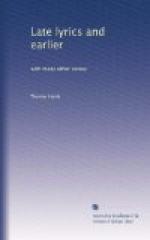But she answered Nay, death-white; and still as he
urged
She adversely spake, overmuch as she loved the while,
Till he pressed for why, and she led with the face
of one scourged
To the neighbouring aisle,
And showed him the words, ever gleaming upon her pew,
Memorizing her there as the knight’s eternal
wife,
Or falsing such, debarred inheritance due
Of celestial life.
He blenched, and reproached her that one yet undeceased
Should bury her future—that future which
none can spell;
And she wept, and purposed anon to inquire of the
priest
If the price were hell
Of her wedding in face of the record. Her lover
agreed,
And they parted before the brass with a shudderful
kiss,
For it seemed to flash out on their impulse of passionate
need,
“Mock ye not this!”
Well, the priest, whom more perceptions moved than
one,
Said she erred at the first to have written as if
she were dead
Her name and adjuration; but since it was done
Nought could be said
Save that she must abide by the pledge, for the peace
of her soul,
And so, by her life, maintain the apostrophe good,
If she wished anon to reach the coveted goal
Of beatitude.
To erase from the consecrate text her prayer as there
prayed
Would aver that, since earth’s joys most drew
her, past doubt,
Friends’ prayers for her joy above by Jesu’s
aid
Could be done without.
Moreover she thought of the laughter, the shrug, the
jibe
That would rise at her back in the nave when she should
pass
As another’s avowed by the words she had chosen
to inscribe
On the changeless brass.
And so for months she replied to her Love: “No,
no”;
While sorrow was gnawing her beauties ever and more,
Till he, long-suffering and weary, grew to show
Less warmth than before.
And, after an absence, wrote words absolute:
That he gave her till Midsummer morn to make her mind
clear;
And that if, by then, she had not said Yea to his
suit,
He should wed elsewhere.
Thence on, at unwonted times through the lengthening
days
She was seen in the church—at dawn, or
when the sun dipt
And the moon rose, standing with hands joined, blank
of gaze,
Before the script.
She thinned as he came not; shrank like a creature
that cowers
As summer drew nearer; but still had not promised
to wed,
When, just at the zenith of June, in the still night
hours,
She was missed from her bed.
“The church!” they whispered with qualms;
“where often she sits.”
They found her: facing the brass there, else
seeing none,
But feeling the words with her finger, gibbering in
fits;
And she knew them not one.
And so she remained, in her handmaids’ charge;
late, soon,
Tracing words in the air with her finger, as seen
that night —
Those incised on the brass—till at length
unwatched one noon,
She vanished from sight.




